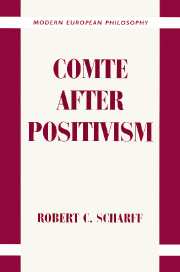Introduction: Comte for a Post-Positivist World
Published online by Cambridge University Press: 06 July 2010
Summary
As hard as it is nowadays to get agreement on what analytic philosophers could still possibly have in common, at least it seems safe to say that there is something they are universally against, namely, positivism. I start with the fact of this antipositivism, because it may appear to cast a shadow over the present study. My purpose in what follows is to urge a revival of interest – contemporary and substantive, not just historical and scholarly interest – in the first and most famous of all the positivists, Auguste Comte. I therefore use this Introduction not only to outline my plans but also to counter the suspicion that Comte is not worth the trouble.
Today's anti-positivism
In the English-speaking world, of course, positivism is now inherited through its last and most sophisticated version, namely, Logical Empiricism; and one generalization to be made about Logical Empiricism is that it embodies a sort of ultimate crystallization of two of positivism's core features – namely, the promotion of a rigorously “scientific” epistemology and a supreme self-confidence about its own objective, systematic, ahistorical outlook. Given the current anti-positivist atmosphere, one might suppose that these two features would be especially favored targets of criticism. Certainly this is true of the first feature. Scientific and, by implication, all other single-model accounts of rationality have been under general attack for some time. Regarding the second feature, however, matters are quite different.
Information
- Type
- Chapter
- Information
- Comte after Positivism , pp. 1 - 16Publisher: Cambridge University PressPrint publication year: 1995
